List of monastic houses in Somerset
The following is a list of the monastic houses in Somerset, England.

Bablew Priory
Banwell Monastery
(alleged site)
(alleged site)
Banwell Monastery
(poss. site)
(poss. site)
Banwell Monastery
(poss. site)
(poss. site)
Barlinch Priory
Brent purported Cell
(very approx. loc.)
(very approx. loc.)
Bridgwater Greyfriars
Clevedon Friary
Green Ore 'Cell'
Illchester Friary
Illchester Nunnery
Stogursey Priory
Locations of monastic houses in Somerset
Alien houses are included, as are smaller establishments such as cells and notable monastic granges (particularly those with resident monks), and also camerae of the military orders of monks (Knights Templars and Knights Hospitaller). Monastic hospitals are included where they had the status or function of an abbey, priory, friary or preceptor/commandery.
- Abbreviations and key
| Symbol | Status |
|---|---|
| None | Ruins |
| * | Current monastic function |
| + | Current non-monastic ecclesiastic function (including remains incorporated into later structure) |
| ^ | Current non-ecclesiastic function (including remains incorporated into later structure) or redundant intact structure |
| $ | Remains limited to earthworks etc. |
| # | No identifiable trace of the monastic foundation remains |
| ~ | Exact site of monastic foundation unknown |
| ≈ | Identification ambiguous or confused |
Locations with names in italics indicate possible duplication (misidentification with another location) or non-existent foundations (either erroneous reference or proposed foundation never implemented) or ecclesiastical establishments with a monastic name but lacking actual monastic connection.
| EH | English Heritage |
| LT | Landmark Trust |
| NT | National Trust |
| Foundation | Image | Communities & Provenance[note 1] | Formal Name or Dedication[note 2] & Alternative Names[note 3] | Online References[note 4] & Location[note 5] |
|---|---|---|---|---|
| Athelney Abbey # |  |
possible early hermitage or monastery founded c.878?; Benedictine? monks founded c.888 by King Alfred (possibly enlarging pre-existing establishment); Benedictine monks (re)founded c.960; dissolved 8 February 1539; granted to John Clayton 1544/5; now on private land, the site of church is marked by a monument erected 1801 |
The Abbey of Saint Peter, Saint Paul and Saint Athelwine, Athelney | [1][2][3][4] Athelney 51°03′35″N 2°56′02″W |
| Bablew Grange | Cluniac monks grange and chapel[note 6] dependent on Montacute |
Bablew Priory | [5] Tintinhull 50°58′22″N 2°43′15″W | |
| Banwell Monastery | Saxon monastery granted to Asser by Alfred c.888; St Andrew's Church, Banwell, possibly on site (alternative possible sites) |
[6] 51°19′42″N 2°51′44″W (alleged) 51°19′19″N 2°51′58″W (possible) 51°19′41″N 2°51′48″W (possible) | ||
| Barlynch Priory | Augustinian Canons Regular founded between 1154 and 1189 (between 1174(?) and 1220), reputedly by William de Say; dissolved before July 1537; granted to Sir John Wallop 1538/9; remains now on site of Barlynch Farm; now in ownership of Working for Wildlife |
The Priory Church of Saint Nicholas, Barlinch ____________________ Barlinch Priory | [7][8][9][10] Brompton Regis 51°03′00″N 3°31′47″W | |
| Barrow Gurney Nunnery | Benedictine nuns founded c.1200 by ___ Gurney, Lord of Stoke Hamden; dissolved 1536; granted to William Clerke 1544/5; incorporated into Barrow Court |
The Blessed Virgin Mary and St Edmund, King and Martyr ____________________ Minchin Barrow Priory; Minchinbarrow Priory Bearwe Priory; Borrow Gurney Priory | [11][12][13] Barrow Gurney 51°24′21″N 2°40′19″W | |
| Bath Abbey + |  |
Saxon nuns founded c.676, reputedly by King Osric, who granted land to Bertana, abbess; destroyed and rebuilt several times; monks refounded before 758; secular? 775; Benedictine? monks refounded 963/4; episcopal diocesan cathedral 1090; dissolved 1539; granted to Humphrey Colles 1542/3; conventual church now in parochial use |
The Abbey Church of Saint Peter and Saint Paul, Bath | [14][15][16][17][18] Bath, Somerset 51°22′53″N 2°21′30″W |
| Bedminster Monastery | Historical county location. See entry under List of monastic houses in Bristol | |||
| Brent Cell ~ | Benedictine monks purported cell dependent on Glastonbury |
East Brent Cell | 51°15′45″N 2°56′30″W (very approx) | |
| Bridgwater Greyfriars ^ | Franciscan Friars (under the Custody of Bristol) founded c.1245 by William Bruer (Briwere); church consecrated 1445 (after rebuilt/extended); dissolved 13 September 1538 |
Bridge Water Friary | [19][20][21][22] [23][24] Bridgwater 51°07′33″N 3°00′25″W | |
| Bristol Austin Friars | Historical county location. See entry under List of monastic houses in Bristol | |||
| Bristol Eremites Friars | Historical county location. See entry under List of monastic houses in Bristol | |||
| Bristol Preceptory | Historical county location. See entry under List of monastic houses in Bristol | |||
| Bruton Abbey |  |
Benedictine monks abbey(?) founded c.1005 by Algar, Earl of Cornwall; dissolved before 1086(?); Augustinian Canons Regular refounded 1127-1135 by William de Mohun raised to abbey status 1511; dissolved 1 April 1539; granted to Maurice Berkely 1545/6 |
[25][26] Bruton 51°06′31″N 2°27′02″W | |
| Buckland Priory | Augustinian Canons Regular founded c.1166 by William de Arlegh (Erlegh), Lord of Durston; dissolved c.1180; Knights Hospitaller preceptory refounded c.1180; dissolved 1433 together with priory of Sisters of St John of Jerusalem (see immediately below); refounded c.1180; dissolved after 1500; Augustinian Canons Regular priory or hospital; refounded after 1500; dissolved 10 February 1539; granted to Alexander Popham and William Halley 1544/5; site now occupied by Buckland Farm |
John the Baptist ____________________ Minchin Buckland Preceptory Buckland Sororum | [27][28][29] [30][31] Durston 51°03′07″N 3°00′23″W | |
| Buckland Sisters of St John Priory | Sisters of St John of Jerusalem transferred from Carbrooke, Clanfield, Gosford, Hampton, Hogshaw, Shingay, Standon and Swingfield; refounded c.1180; together with Knights Hospitaller Preceptory on the site of former Augustinian Canons Regular priory (see immediately above); dissolved after 1500; Augustinian Canons Regular priory or hospital founded on site (see immediately above); site now occupied by Buckland Farm |
St Mary and St Nicholas | ||
| Burtle Priory | hermitage, endowed by William son of Godfrey of Eddington 1199; Augustinian Canons Regular priory cell dependent on Glastonbury 1267; refounded before 1270; independent from 1275; dissolved 1536; granted to John and James Bisse 1553/4: parochial church of St Philip and St James Church built on the site |
The Holy Trinity, the Blessed Virgin Mary and St Stephen ____________________ Burtle Moor Priory; St Stephens Chapel, Sprauellissmede; Byrkley Priory; Burcle Priory; Bercle Priory; Brademers Priory | [9][26][32][33] Burtle 51°11′08″N 2°52′27″W | |
| Cannington Priory | 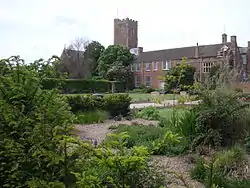 |
Benedictine nuns — from Dorset founded c.1138 by Robert de Courcey; transferred to Colwich, Staffordshire; converted into a mansion; reverted to nunnery; dissolved 1536; granted to Edward Rogers 1538/9; remains incorporated into Cannington Court, built on site |
Canyngton Nunnery | [34][35][36] [37][38] Cannington, Somerset 51°09′01″N 3°03′41″W |
| Charterhouse on Mendip | Carthusian monks grange (purported cell) dependent on Witham; granted Robert May 1544/5 |
|||
| Cheddar Monastery | reference to community 978; called a minster | |||
| Chewstoke Cell | cell(?) founded (?) by Elizabeth de Sancta Cruce; dissolved before 1500(?) |
Holy Cross | [39][40] | |
| Clevedon Friary * | Franciscan Friars Minor extant |
Friary and Parish of the Immaculate Conception | [41] 51°26′39″N 2°51′35″W | |
| Cleeve Abbey | 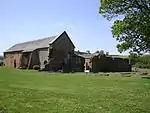 |
Cistercian monks — from Revesby founded between 1186 and 1191, land granted by William de Roumare (Romara), Earl of Lincoln (building apparently begun by 1198 - 24 or 25 June 1198); dissolved 1536; granted to Thomas, Earl of Sussex 1541/2; (EH[note 7]) |
Vallis Florida; Clyve Abbey; Cliff Abbey | [42][43][44] [45][46][47][48][49] Washford/Old Cleeve 51°09′19″N 3°21′53″W |
| Dodlinch Priory ~ | Augustinian Canons Regular — Victorine possibly initially dependent on Bristol; associated with the Victorine abbey at Bristol; founded c.1210 by William de Courtney; transferred to new site at Woodspring ?before 1226; dissolved 1230 |
Dodelyng Priory | [50][51] | |
| Downside Abbey *[note 8] |  |
Benedictine monks (community founded at Douai 1607); transferred from Douai founded 1814 |
The Abbey Church of Saint Gregory the Great, Downside, Stratton-on-Fosse | [52][53] Stratton-on-the-Fosse 51°15′14″N 2°29′37″W |
| Dunster Priory +[note 9] | 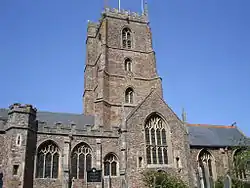 |
Benedictine monks dependent on Bath; founded c.1100 (after 1090) by William de Mohun; dissolved 1539; granted to Humphrey Colles 1542/3; church in parochial use as the Priory Church of St George |
Priory Church of St George | [54][55][56][57] [58][59][60] Dunster 51°10′56″N 3°26′45″W |
| Frome Monastery | Saxon (Benedictine?) monks — purportedly from Malmesbury; founded after 675 by St Aldhelm; dissolved before 690? |
|||
| Glastonbury Abbey |  |
Saxon monks founded c.6th century(?); Benedictine? monks founded c.705; secular 9th century? Benedictine monks (re)founded(?) c.960; dissolved 15 November 1539; granted to Edward, Duke of Somerset 1547/8; granted to Sir Peter Carew 1558/9; ruins purchased by the Bath and Wells Diocesan Trust 1908; now in ownership of the Church of England with public access |
The Abbey Church of Saint Mary, Glastonbury | [61][62][63][64] [65][66][67][68] Glastonbury 51°08′45″N 2°42′50″W |
| Green Ore Cell(?) | Bendictine monks 'cell of Glaston'; probable grange of Hinton Charterhouse |
Green Oare | [69] 51°14′55″N 2°36′27″W | |
| Haselbury Priory | hermitage to 1154; Augustinian Canons Regular William fitz Walter began house — apparently not completed; possibly destroyed in the contests of the barons |
|||
| Hinton Priory |  |
Carthusian monks (community founded 1222 at Hatherop, Gloucestershire 1222); transferred here May 1232; dissolved 1539; now in private ownership without public access |
Hinton Charterhouse | [70][71][72] Hinton Charterhouse 51°19′53″N 2°19′11″W |
| Ilchester Blackfriars # | Dominican Friars founded between 1221 and 1260; dissolved 1538; demolished early 19th century |
[73][74][75] Ilchester 51°00′02″N 2°41′05″W | ||
| Ilchester Nunnery | hospital founded c.1217-1220 by William Dennis (Dacus); Augustinian Canonesses refounded before 1281; dissolved before 1463 |
Whitehall Hospital of the Holy Trinity ____________________ Blanchesale Hospital; Whitehall Hospital | [76][77][78] [79][80][81] Ilchester 51°00′09″N 2°40′58″W | |
| Ilminster | possible Saxon minster; land granted to Muchelney by King Ine; no record of community | |||
| Keynsham Abbey |  |
Augustinian Canons Regular founded c.1170 by William, Earl of Gloucester dissolved 1539; granted to Thomas Bridges, Esq 1552/3 |
[82][83][84][85] Keynsham 51°24′47″N 2°29′48″W | |
| Kilve Chantry | 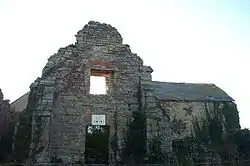 |
founded 1329 by Simon de Furneaux; dissolved late 14th century damaged by fire in 1848 |
[9][86][87][88][89] [90][91] Kilve 51°11′21″N 3°13′22″W | |
| Langley Priory | uncertain order and foundation house of St Mary, brothers or canons, short-lived establishment 12th century |
|||
| Martock Priory | granted to Humphry Colles 1542/3 | |||
| Moorlynch Cell | Benedictine monks cell dependent on Glastonbury |
|||
| Montacute Priory | Cluniac monks founded between c.1078 and 1102 by William, Count of Mortain dissolved 1539; granted to Robert, Earl of Leicester 1573/4; remains now part of Abbey Farmhouse |
Montecute; Mons Acutus | [92][93][94][95] Montacute 50°56′59″N 2°43′10″W | |
| Muchelney Abbey |  |
Benedictine? monks founded before 693 traditionally by King Ine; destroyed in raids by the Danes(?)c.878 secular collegiate? founded 939 by King Athelstan; Benedictine monks founded c.950 (959); dissolved 3 January 1538; granted to Edward, Earl of Hertford 1537/8; (EH[note 10]) |
Michelney Abbey | [96][97][98] Muchelney 51°01′00″N 2°49′13″W |
| Pennard Minster | Saxon minster | |||
| Pitminster | possible Saxon minster | |||
| Potbury Priory | Augustinian Canons Regular possible priory dependent on Bristol — no record of cell |
|||
| Regil Grange | Cistercian monks grange? dependent on Flaxley; founded before 1200(?) |
|||
| Stavordale Priory | 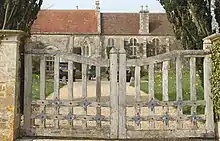 |
Augustinian Canons Regular — Vitorine founded before 1243 by a member of the Lovel family; merged with Taunton 1533; granted to John, Earl of Oxford 1544/5; conventual church converted into a private house, renovated and extended in 1905 |
Slaverdale Priory | [99][100][101][102] Charlton Musgrove 51°05′11″N 2°22′34″W |
| Steep Holme Cell | Augustinian Canons Regular cell dependent on Studley, Oxfordshire; founded before 1260; dissolved before 1300 |
|||
| Stogursey Priory |  |
Benedictine monks alien house: dependent on Lonlay 1183; founded 1100-7: church granted by William de Falaise and his wife Geva; founded c.1204 granted to Eton College 1440; last prior left 1442 |
Priory of St. Andrews of the Ards ____________________ Stoke Courcy Priory | [88][103][104][105] [106][107] Stogursey 51°10′52″N 3°08′27″W |
| Taunton Priory #[note 11] | 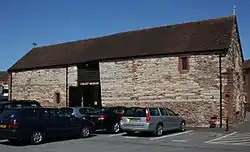 |
secular collegiate founded before 904; Augustinian Canons Regular founded c.1120 (c.1115) by William Giffard, Bishop of Winchester; dissolved 1539; granted to Mathew Colehurst 1544/5; part of remains now called 'Priory Barn'; converted into a cricket museum |
The Priory Church of Saint Peter and Saint Paul, Taunton | [108][109][110][111] Taunton 51°01′05″N 3°05′54″W |
| Taunton Whitefriars | Carmelite Friars licence granted 1341; revoked 1343; house never established |
[112] | ||
| Templecombe Preceptory | Knights Templar granted by Serlo FitzOdo in 1185. founded c.1185 dissolved 1308–12; Knights Hospitaller granted 1312 dissolved 1539; granted to Richard Andrews and Leonard Chamberlayne |
Combe Templariorum; Temple Comb Preceptory | [113][114][115][116] Templecombe 50°59′59″N 2°24′55″W | |
| Witham Friary +[note 12] |  |
Carthusian monks founded 1178/9 (1180/1); dissolved 1539; granted to Ralph Hopton 1544/5; church now in parochial use |
The Friary Church of the Blessed Virgin Mary, Witham The Parish Church of the Blessed Virgin Mary, Saint John Baptist and All Saints, Witham Friary (former lay brothers' church) ____________________ Witham Abbey Witham Charterhouse; Selwood Friary | [117][118][119] [120][121][122] Witham Friary 51°10′02″N 2°21′55″W |
| Woodspring Priory ^[note 13] |  |
Augustinian Canons Regular — Victorine (community founded at Dodlinch c.1210); transferred here before 1226; dissolved 1539; granted to William and John Lacy 1559/60; currently in use as an exhibuiltion centre for artwork; (LT[note 14]) |
The Priory Church of the honour of the Holy Trinity, Saint Mary the Virgin and Saint Thomas the Martyr of Canterbury, Worspring ____________________ Worspring Priory | [123] Weston-super-Mare 51°23′26″N 2°56′42″W |
| Worminster | Saxon minster | Wormester | ||
| Wyrall Nunnery | alleged early nunnery[note 15] | St Peter ____________________ Wyrall Hill Nunnery | ||
| Yenston Priory #[note 16] | Benedictine monks alien house: cell or grange(?) dependent on St Sever; founded before c.1090 (before 1100) by Hugh d'Avranches, 1st Earl of Chester (Hugh Abrincis); mentioned in the reign of Edward I; doubtful it ever had status of priory; granted to Eton College c.1468; exchanged for other lands; held by Sir Thomas Bell by 1548; house possibly built on site 16th century; adjacent fields called 'Priory Plot' and 'Priors' possibly associated with the grange |
[51][124][125] Henstridge 50°59′19″N 2°24′39″W or 50°59′15″N 2°24′52″W | ||
See also
Notes
- Communities & Provenance shows the status and communities existing at each establishment, together with such dates as have been established as well as the fate of the establishment after dissolution, and the current status of the site.
- Formal Name or Dedication: shows the formal name of the establishment or the person in whose name the church is dedicated.
- Alternative Names: some of the establishments have had alternative names over the course of time. In order to assist in text-searching such alternatives in name or spelling have been provided.
- Online References: presents links to online references to the particular establishment in addition to the general printed and online references given at the foot of this article. Establishments for which online references have not been specified are referred to within the printed references listed.
- Location: provides a link to the geographical position of the site of the foundation where established. Where the location has been established the location is pinpointed (dependent on the available resolution of the map data), otherwise the general location is given in italic.
- Bablew: given as priory by Tanner, Notitia Monastica
- The current trustee of this site is English Heritage
- This site has a current monastic function.
- This site has a current non-monastic ecclesiastic function.
- The current trustee of this site is English Heritage
- There is no identifiable trace of the monastic foundation remains at this site.
- This site has a current non-monastic ecclesiastic function.
- This site has a current non-ecclesiastic function.
- The current trustee of this site is the Landmark Trust
- Wyrall Nunnery, considered legendary by W. Dugdale, Monasticon Anglicanum, Volume 4, p.1623
- No identifiable trace of the monastic foundation remains at this site.
References
- Historic England. "Athelney Abbey (191911)". PastScape. Retrieved 11 November 2011.
- Page, William, ed. (1911). "Houses of Benedictine monks: The abbey of Athelney". A History of the County of Somerset: Volume 2. Institute of Historical Research. Retrieved 10 November 2011.
- Adkins, Lesley; Roy Adkins (1992). A field Guide to Somerset Archaeology. Stanbridge: Dovecote Press. pp. 21–22. ISBN 0-946159-94-7.
- Historic England. "King Alfred's Monument with railings (1173838)". National Heritage List for England. Retrieved 9 February 2007.
- Historic England. "Bablew Grange (1303372)". PastScape. Retrieved 11 November 2011.
- Historic England. "Banwell Court (194496)". PastScape. Retrieved 11 November 2011.
- Historic England. "Barlinch Priory (36537)". PastScape. Retrieved 11 November 2011.
- Page, William, ed. (1911). "Houses of Augustinian canons: The priory of Barlynch". A History of the County of Somerset: Volume 2. Institute of Historical Research. Retrieved 10 November 2011.
- Bush, Robin (1994). Somerset: The complete guide. Wimborne, Dorset: Dovecote Press. p. 46. ISBN 1-874336-26-1.
- Historic England. "Barlich Farmhouse (1237516)". National Heritage List for England. Retrieved 12 July 2009.
- Historic England. "Barrow Court (197963)". PastScape. Retrieved 11 November 2011.
- Page, William, ed. (1911). "Houses of Benedictine nuns: The priory of Barrow Gurney". A History of the County of Somerset: Volume 2. Institute of Historical Research. Retrieved 10 November 2011.
- "Barrow Gurney". GenUKI. Retrieved 5 January 2008.
- Historic England. "Abbey Church of St Peter and St Paul (204213)". PastScape. Retrieved 11 November 2011.
- Diana E. Greenway (2001). "Bishops". Fasti Ecclesiae Anglicanae 1066-1300: volume 7: Bath and Wells. Institute of Historical Research. Archived from the original on 19 September 2013. Retrieved 10 November 2011.
- "Bath Abbey". Robert Poliquin's Music and Musicians. Quebec University. Retrieved 18 September 2007.
- Historic England. "Bath Abbey (442109)". Images of England. Archived from the original on 3 November 2007.
- "Bath Abbey". Sacred destinations. Retrieved 11 November 2011.
- Historic England. "Bridgwater Greyfriars (190943)". PastScape. Retrieved 11 November 2011.
- Page, William, ed. (1911). "Friaries: The Franciscans at Bridgwater". A History of the County of Somerset: Volume 2. Institute of Historical Research. Retrieved 10 November 2011.
- "Franciscan Friary and later mansion, Bridgwater". Somerset County Council. Retrieved 4 September 2009.
- "Friarn Meadow, Bridgwater, Somerset". Wessex Archaeology. 30 April 2008. Retrieved 6 January 2010.
- "Bridgwater Friary, Somerset". Wessex Archaeology. Retrieved 6 January 2010.
- "Medieval decorated tile from Friarn Meadow, Bridgwater". Cattermoles Consultants. Archived from the original on 4 October 2011. Retrieved 11 November 2011.
- Historic England. "Bruton Abbey (199997)". PastScape. Retrieved 11 November 2011.
- Page, William, ed. (1911). "Houses of Augustinian canons: The priories of Bruton and Burtle Moor". A History of the County of Somerset: Volume 2. Institute of Historical Research. Retrieved 10 November 2011.
- Historic England. "Buckland Priory (191893)". PastScape. Retrieved 11 November 2011.
- R W Dunning, C R Elrington (Editors), A P Baggs, M C Siraut (1992). "Durston". A History of the County of Somerset: Volume 6: Andersfield, Cannington, and North Petherton Hundreds (Bridgwater and neighbouring parishes). Institute of Historical Research. Retrieved 10 November 2011.CS1 maint: multiple names: authors list (link)
- Historic England. "Lodge Farmhouse (1060491)". National Heritage List for England. Retrieved 8 January 2009.
- "Notes on Buckland Priory". Vagg.org. Archived from the original on 14 January 2012. Retrieved 6 January 2010.
- "Mynchin Buckland Priory, Durston". Somerset Historic Environment Record. Somerset County Council. Retrieved 6 January 2010.
- Historic England. "Burtle Priory (192270)". PastScape. Retrieved 11 November 2011.
- "About St Philip & St James Church". Burtle Village. Retrieved 6 January 2010.
- Historic England. "Cannington Priory (190988)". PastScape. Retrieved 11 November 2011.
- Page, William, ed. (1911). "Houses of Benedictine nuns: The priory of Cannington". A History of the County of Somerset: Volume 2. Institute of Historical Research. Retrieved 10 November 2011.
- "Priory History". Cannington Online. Archived from the original on 20 July 2011. Retrieved 13 January 2008.
- Historic England. "Cannington Court (1344930)". National Heritage List for England. Retrieved 13 January 2008.
- Historic England. "Church of St Mary (1059059)". National Heritage List for England. Retrieved 13 January 2008.
- Ross, Lesley (2004). Before the Lake. Harptree History Society. pp. 20–21. ISBN 0954883209.
- Gilchrist, Roberta (1997). Gender and Material Culture: The Archaeology of Religious Women. Psychology Press. pp. 183–185. ISBN 9780415156561.
- Clevedon Archived 15 February 2012 at the Wayback Machine
- Historic England. "Cleeve Abbey (188617)". PastScape. Retrieved 11 November 2011.
- Harrison, Steve (2000). Cleeve Abbey Colour Handbook. English Heritage. pp. 24–35. ISBN 978-1-85074-760-4.
- Page, William, ed. (1911). "House of Cistercian monks: The abbey of Cleeve". A History of the County of Somerset: Volume 2. Institute of Historical Research. Retrieved 10 November 2011.
- Platt, Colin (1984). The Abbeys and Priories of Medieval England. Secker & Warburg. pp. 24–34. ISBN 978-0-436-37557-6.
- Robinson, David; Janet Burton; Nicola Coldestroyedeam; Glyn Coppack; Richard Fawcett (1988). The Cistercian Abbeys of Britain. Batsford Ltd. p. 86. ISBN 978-0-7134-8392-5.
- Leete-Hodge, Lornie (1985). Curiosities of Somerset. Bodmin: Bossiney Books. p. 43. ISBN 0-906456-98-3.
- "Cleeve Abbey, Washford". Somerset Historic Environment Record. Somerset County Council. Retrieved 13 July 2008.
- James, Montagu Rhodes (1926). Abbeys. The Ballantyne Press. pp. 124–126.
- Historic England. "Woodspring Priory (192662)". PastScape. Retrieved 11 November 2011.
- Page, William, ed. (1911). "Houses of Augustinian canons: The priory of Worspring". A History of the County of Somerset: Volume 2. Institute of Historical Research. Retrieved 10 November 2011.
- Historic England. "Downside Abbey Church (200728)". PastScape. Retrieved 11 November 2011.
- Historic England. "Abbey Church of St Gregory The Great, Downside Abbey and School (1058633)". National Heritage List for England. Retrieved 24 March 2007.
- Historic England. "Dunster Priory (36848)". PastScape. Retrieved 11 November 2011.
- Page, William, ed. (1911). "Houses of Benedictine monks: The priory of Dunster". A History of the County of Somerset: Volume 2. Institute of Historical Research. Retrieved 10 November 2011.
- Historic England. "Priory Church of St George (1057646)". National Heritage List for England. Retrieved 28 September 2007.
- "Benedictine Priory, Dunster". Somerset Historic Environment Record. Somerset County Council. Retrieved 7 January 2010.
- "History of Dunster Church & Priory". Dunster Tithe Barn. Retrieved 7 January 2010.
- Poyntz Wright, Peter (1981). The Parish Church Towers of Somerset, Their construction, craftsmanship and chronology 1350 - 1550. Avebury Publishing Company. p. 210. ISBN 0-86127-502-0.
- "Dunster Tithe Barn". Everything Exmoor. Archived from the original on 13 July 2011. Retrieved 11 November 2011.
- Historic England. "Glastonbury Abbey (196705)". PastScape. Retrieved 11 November 2011.
- Page, William, ed. (1911). "Houses of Benedictine monks: The abbey of Glastonbury". A History of the County of Somerset: Volume 2. Institute of Historical Research. Retrieved 10 November 2011.
- Historic England. "Glastonbury Abbey (1345447)". National Heritage List for England. Retrieved 11 November 2006.
- Carley, James P (1996). Glastonbury Abbey: The Holy House at the Head of the Moors Adventurous. New York: St. Martin's Press. ISBN 0-906362-23-7.
- Abrams, Lesley; James Carley (1991). The Archaeology and History of Glastonbury Abbey: Essays in Honour of the ninetieth birthday of C.A.Ralegh Radford. Boydell Press. ISBN 978-0-85115-284-4.
- Carley, James P. (2001). Glastonbury Abbey and the Arthurian Tradition. Arthurian Studies. D.S.Brewer. ISBN 978-0-85991-572-4.
- Rouse, Robert Allen; Cory James Rushton (2005). The Medieval Quest for Arthur. The History Press Ltd. ISBN 978-0-7524-3343-1.
- Rahtz, Philip; Lorna Watts (2003). Glastonbury: Myth and Archaeology (2 ed.). The History Press LTD. pp. 85–126. ISBN 978-0-7524-2548-1.
- Historic England. "Monument No. 1301521". PastScape. Retrieved 10 October 2015.
- Historic England. "Hinton Priory (202965)". PastScape. Retrieved 11 November 2011.
- Page, William, ed. (1911). "Houses of Carthusian monks: The priory of Hinton". A History of the County of Somerset: Volume 2. Institute of Historical Research. Retrieved 10 November 2011.
- Historic England. "The chapter house (1320809)". National Heritage List for England. Retrieved 20 November 2006.
- Historic England. "Ilchester Blackfriars (196558)". PastScape. Retrieved 11 November 2011.
- R. W. Dunning (editor), A. P. Baggs, R. J. E. Bush, Margaret Tomlinson (1974). "Parishes: Ilchester". A History of the County of Somerset: Volume 3. Institute of Historical Research. Retrieved 10 November 2011.CS1 maint: multiple names: authors list (link)
- "Dominican friary, West Street, Ilchester". Somerset Historic Environment Record. Somerset County Council. Retrieved 4 September 2009.
- Historic England. "Whitehall Hospital (196552)". PastScape. Retrieved 11 November 2011.
- "Augustinian nunnery, High Street, Ilchester". Somerset Historic Environment Record. Somerset County Council. Retrieved 4 September 2009.
- Page, William (1911). "Hospitals: Ilchester and Langport'". A History of the County of Somerset: Volume 2. British History Online. Retrieved 9 January 2010.
- James Stevens-Cox, A History of Ilchester, the ancient county town of Somerset nos. 1–6, 8 & 9 (1958), p. 129
- Power, Eileen (1988). Medieval English Nunneries, c. 1275 to 1535. Biblo & Tannen Booksellers & Publishers Incorporat. p. 233. ISBN 978-0-8196-0140-7.
- "Chapel, Whitehall hospital and nunnery, High Street, Ilchester". Somerset Historic Environment Record. Somerset County Council. Retrieved 9 January 2010.
- Historic England. "Keynsham Abbey (200923)". PastScape. Retrieved 11 November 2011.
- Page, William, ed. (1911). "Houses of Augustinian canons: The abbey of Keynsham". A History of the County of Somerset: Volume 2. Institute of Historical Research. Retrieved 10 November 2011.
- Historic England. "Keynsham Abbey (1384577)". National Heritage List for England. Retrieved 18 July 2007.
- Barrett, J.H. (1969). "A Fipple Flute or Pipe from the Site of Keynsham Abbey". The Galpin Society Journal. 22: 47–50. doi:10.2307/841627. JSTOR 841627.
- Historic England. "Kilve Chantry (189866)". PastScape. Retrieved 11 November 2011.
- Historic England. "Remains of Chantry, abutting East side of Chantry Cottage (1345688)". National Heritage List for England. Retrieved 7 October 2007.
- Waite, Vincent (1964). Portrait of the Quantocks. London: Robert Hale. pp. 67–70. ISBN 0-7091-1158-4.
- "Remains of Chantry, abutting East side of Chantry Cottage, Sea Lane (West side), Kilve". Somerset Historic Environment Record. Somerset County Council. Retrieved 7 January 2010.
- "Kilve chantry, Kilve". Somerset Historic Environment Record. Somerset County Council. Retrieved 7 January 2010.
- "Remains of Chantry at Kilve, Sea Lane, Kilve, West Somerset, Somerset". Buildings at Risk Register. Historic England. Retrieved 10 February 2018.
- Historic England. "Montacute Priory (193145)". PastScape. Retrieved 11 November 2011.
- Page, William, ed. (1911). "House of Cluniac monks: The priory of Montacute". A History of the County of Somerset: Volume 2. Institute of Historical Research. Retrieved 10 November 2011.
- "Montacute Priory". Somerset Historic Environment Record. Somerset County Council. Retrieved 12 July 2009.
- Historic England. "Abbey Farmhouse (1057256)". National Heritage List for England. Retrieved 11 July 2009.
- Historic England. "Muchelney Abbey (193791)". PastScape. Retrieved 11 November 2011.
- Page, William, ed. (1911). "Houses of Benedictine monks: The abbey of Muchelney". A History of the County of Somerset: Volume 2. Institute of Historical Research. Retrieved 10 November 2011.
- Historic England. "The Abbot's House, Muchelney Abbey (1236790)". National Heritage List for England. Retrieved 25 September 2007.
- Historic England. "Stavordale Priory (202645)". PastScape. Retrieved 11 June 2009.
- Page, William (1911). "The Priory of Stavordale". Houses of Augustinian Canons. British History Online. pp. 139–141. Retrieved 11 June 2009.
- Bush, Robin (1994). Somerset: The complete guide. Wimborne, Dorset: Dovecote Press. p. 62. ISBN 1-874336-26-1.
- Historic England. "Stavordale Priory (1176699)". National Heritage List for England. Retrieved 8 December 2008.
- Historic England. "Church of St Andrew (191224)". PastScape. Retrieved 11 November 2011.
- Page, William, ed. (1911). "Alien house: The priory of Stogursey". A History of the County of Somerset: Volume 2. Institute of Historical Research. Retrieved 10 November 2011.
- Gathercole, Clare. "Stogursey". Somerset Urban Archaeological Survey. Somerset County Council. Archived from the original (PDF) on 17 July 2011. Retrieved 2 February 2010.
- Kerr, William (1989). "Black Abbe, the archbishops of Armagh and the Church of Derryaghy". Lisburn Historical Society Journals. 7. Archived from the original on 5 January 2006.
- Historic England. "Church of St. Andrew (1057404)". National Heritage List for England. Retrieved 12 July 2008.
- Historic England. "Taunton Priory (190832)". PastScape. Retrieved 11 November 2011.
- Page, William, ed. (1911). "Houses of Augustinian canons: The priory of Taunton". A History of the County of Somerset: Volume 2. Institute of Historical Research. Retrieved 10 November 2011.
- Hugo, Thomas (1860). The History of Taunton Priory in the County of Somerset. J. R. Smith, London. ISBN 978-1-4373-7535-0.
- Gathercole, Clare (2002). "English Heritage Extensive Urban Survey, An archaeological assessment of Taunton" (PDF). Somerset County Council. Archived from the original (PDF) on 17 July 2011. Retrieved 11 November 2011.
- Page, William, ed. (1911). "Friaries: The Carmelites at Taunton". A History of the County of Somerset: Volume 2. Institute of Historical Research. Retrieved 10 November 2011.
- Historic England. "Templecombe Templars Preceptory (202471)". PastScape. Retrieved 11 November 2011.
- Page, William, ed. (1911). "House of Knights Templar: The preceptory of Templecombe". A History of the County of Somerset: Volume 2. Institute of Historical Research. Retrieved 10 November 2011.
- Grand Priory of Knights Templar in England and Wales Archived 29 June 2008 at the Wayback Machine
- "1996 - 03 - Templecombe, Somerset". Unofficial Time Team Site. Archived from the original on 2 March 2008. Retrieved 28 January 2008.
- "Witham Friary Somerset". A Vision of Britain through time. Retrieved 15 December 2015.
- Reid, Robert Douglas (1979). Some buildings of Mendip. The Mendip Society. pp. 16–17. ISBN 0-905459-16-4.
- Samuel Lewis (editor) (1848). "Witham Fiary (St Mary)". A Topographical Dictionary of England. Institute of Historical Research. Retrieved 10 November 2011.CS1 maint: extra text: authors list (link)
- "Land adjoining Gramarye, Witham Friary, Somerset" (PDF). Context One Archaeological Services. Archived from the original (PDF) on 20 August 2007. Retrieved 2 September 2007.
- "Purchasing Power of British Pounds from 1264 to 2006". Measuring worth.com. Archived from the original on 27 September 2007. Retrieved 2 September 2007.
- "Local History — Witham Friary". Somerset Larders.com. Retrieved 2 September 2007.
- Historic England. "Church of the Blessed Virgin Mary (1057100)". National Heritage List for England. Retrieved 19 October 2007.
- Historic England. "Monument No. 202479". PastScape. Retrieved 10 October 2015.
- "Benedictine priory, Yenston". Somerset Historic Environment Record. Somerset County Council. Retrieved 26 September 2010.
- Bibliography
- Binns, Alison (1989) Studies in the History of Medieval Religion 1: Dedications of Monastic Houses in England and Wales 1066–1216, Boydell
- Cobbett, William (1868) List of Abbeys, Priories, Nunneries, Hospitals, And Other Religious Foundations in England and Wales and in Ireland, Confiscated, Seized On, or Alienated by the Protestant "Reformation" Sovereigns and Parliaments
- Knowles, David & Hadcock, R. Neville (1971). Medieval Religious Houses England & Wales. Longman. ISBN 0582112303.
- Morris, Richard (1979) Cathedrals and Abbeys of England and Wales, J. M. Dent & Sons Ltd.
- Thorold, Henry (1986) Collins Guide to Cathedrals, Abbeys and Priories of England and Wales, Collins
- Thorold, Henry (1993) Collins Guide to the Ruined Abbeys of England, Wales and Scotland, Collins
- Wright, Geoffrey N., (2004) Discovering Abbeys and Priories, Shire Publications Ltd.
- English Cathedrals and Abbeys, Illustrated, Odhams Press Ltd.
- Map of Monastic Britain, South Sheet, Ordnance Survey, 2nd edition, 1954
This article is issued from Wikipedia. The text is licensed under Creative Commons - Attribution - Sharealike. Additional terms may apply for the media files.